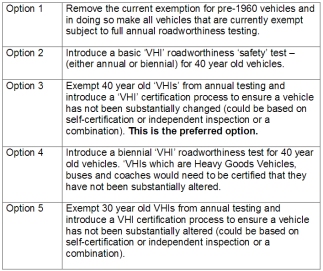Government
wants cars made before 1977 to be MOT free - consultation
ends on 2nd November 2016
You
have only one month to save the MOT or an alternative annual test for classic
cars
It's
essential you consider the classic car MOT proposals from the DfT and if you feel
they are unwise or not safe, or indeed if you agree with them, then please express
your views by participating in the online DfT consultation
before it closes on 2nd November 2016.
DfT
says "we are consulting on proposals to implement an exemption from testing
for vehicles over 40 years old. This includes options to:
> exempt all
vehicles over 30 years old.
> have alternative testing requirements.
> remove the exemption.
We are proposing that vehicles which have been ‘substantially
altered’ will not be exempt from testing".
See the DfT webpage
with links to briefing documents and an online smart survey form. More
Ways to respond to the DfT consultation
The alternatives are:
Respond
online using the DfT smart survey
form
or
Email your views to DfT by email
or
Write to the DfT at:
David Pope
Department for Transport
Freight, Operator Licensing and Roadworthiness
Zone 3/28, Great Minster House
33 Horseferry Road, London
SW1P 4DRDon't
delay sending in your views to DfT on their MOT exemption options as time is running
out - the consultation will close on 2nd November 2016.
"VHI"
- vehicle of historic interest.
Updated:
160928
Posted: 160922 | | DfT
has reopened consultation over the extension of the MOT testing exemption for
vehicles of historic interest with a very short period for the public to contribute
their views
A lead article in the latest issue of Classic Car Weekly highlights
the real concerns over the "DfT calling for cars manufactured before 1977
to be MOT free and suggests 30 year old cars could skip testing in the future.
This would lead to 331,000 vehicles registered between 1960 and 1977 being exempted
from mandatory annual testing. The UK Government cites the reasons for the consultation
they have launched as due to EU Directive changes". CCW's markets
editor Richard Barnett response to the proposals and consultation is "Words
fail me, it's stupid".
What are the options proposed by the DfT
in its consultation exercise?

This
table is set out on page 11 of the DfT's briefing document. More
| Comment
Some
exemption from the rigours of a full scale MOT test for older vehicles is welcome
because the increased mechanisation of testing procedures introduces risks of
damage to elderly vehicles. Also the lack of knowledge of older vehicles on the
part of some of the younger generation of testers is a concern. The groups representing
historic vehicles were never proposing an exemption date as recent as 1960 and
moving the date backwards would now be difficult without compelling evidence.
On the other hand completely exempting from testing vehicles as late as 1978 (assuming
that is when it would come into force) seems like folly. Those who can barely
afford to run a car will buy that age of vehicle and may run it into the ground,
but without any form of annual testing they may in fact run it into somebody else
first!
The essential feature of an annual test - whether an MOT
or an alternative annual test - of an historic or classic car is the discipline
of preparing and presenting the car for the test so basic safety checks are made
by both the owner and the tester. Surely removing that test would be very unwise.
Option 2 - Introduce a basic "VHI" roadworthiness "safety"
test for 40 year old vehicles
This option would maintain the discipline
of an an annual or biennial test of whether a vehicle is safe to be on public
roads. By focusing on safety rather than the Germanic emphasis on originality
with all the complications that introduces, it tests the key feature - safety.
If this option were adopted then the cut off age could be reduced from 40 to 30
years which would please many classic car owners. Any sort of annual mileage limitation
would be generally seen as wrong in principle, uncalled for in the EU directive,
and unworkable in practice.
Option 3 is the DfT preferred option.
The real issue is safety not whether the car has been modified. That has always
been the pragmatic and sensible approach adopted in the UK. |
|
|





